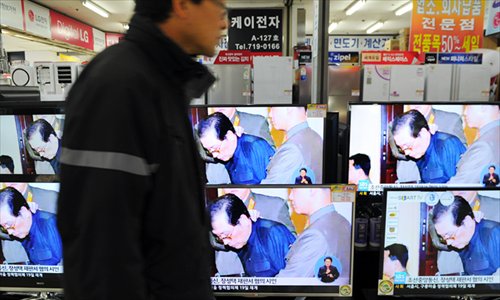HOME >> OP-ED
Political stability in N.Korea benefits all
Source:Global Times Published: 2013-12-14 0:18:02

Television monitors displayed at the Yongsan electronic market in Seoul Friday show Jang Song-thaek’s last appearance at the tribunal before his execution. Photo: AFP
Pyongyang announced Friday that Jang Song-thaek had been executed, causing another big stir among North Korea watchers. Beijing said on Friday that this is North Korea's internal affair and China hopes the country remains stable.
The lightning series of occurrences within North Korea shows that it is seen as a sharp struggle domestically. Kim Jong-un has consolidated his absolute authority, and he has an absolute say over the country's political situation and development direction.
It is right for China to choose not to interfere in North Korea's internal affairs, especially those concerning Pyongyang's political power geometry. But as Chinese society has long been diversified, it is impossible for the Chinese government to unify social attitudes toward North Korea.
The majority of the public here holds a negative attitude toward the recent events in Pyongyang. This may impose some restrictions on Sino-North Korean ties. Chinese aid to North Korea may face more questioning, and grass-roots interaction may lose some momentum.
The two countries, as friendly neighbors, now face some new challenges. Understandably, Pyongyang will be sensitive to voices from the Chinese public, and thus urge Beijing to impose more regulations on public opinion. Pyongyang also hopes to gain absolute support from Beijing. Developing friendly relations is strategically important for both sides, but frictions do exist, especially over the North Korea nuclear issue.
China needs to help the new North Korean leadership to properly solidify the sense of security it needs most, which is key to their mutual strategic trust. But at the same time, China also needs to make it clear that North Korea should adapt more to China's situation, including China's independent public opinion ecology. China cannot pander to North Korea's sentiments in every possible aspect. We hope these principles can be guaranteed within the larger framework of the Sino-North Korean friendship.
China has never changed its attitude of not interfering in North Korea's domestic affairs, but this does not mean the Chinese public cannot voice its opinions over Jang's death. If North Korea has such a requirement, it is not the proper attitude that Pyongyang should take toward a world power.
China sincerely hopes North Korea can realize comprehensive stability soon, and accumulate momentum for reform and opening-up. Supporting Sino-North Korean friendship remains a mainstream public wish in China.
Pyongyang has hardly taken any initiative in communicating with Chinese media. If it makes a change in this regard and tries to interact with the Chinese public, this might lead to a series of positive breakthroughs.
Posted in: Editorial